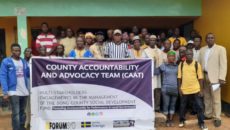In a previous article in this series, I provided an overview of the County Development Fund and how it works. In this piece, I will explore some of the inadequacies of the program and propose ways in which it can be improved.
In order to build a better Liberia, certain areas of the CDF need improvements. One of the primary issues that needs to be resolved is the fact that there is no standard formula for allocating the CDF to account for the different populations in each county in addition to differing levels of development.
Additionally, legislators and executive appointees have had a rivalry for control in the counties over how the CDF is used to get political gains in the eyes of citizens and voters. This executive-legislature conflict has slowed down development in some counties, such as Nimba in 2014.
The president uses the county administrations for control on the ground while the legislative caucus uses the PMC to counter the powers of the county administration by relying on the Budget Law. This provision of the law creates role conflict between the offices of the Assistant Superintendent for Development and PMC. The ASD and PMC collide in functions due to their separate obligations to the management development project.
Another area for consideration is the apparent confusion over the selection of delegates to County Council gatherings. The Budget Law instructs the County Superintendent to convene the County Council in close consultation with the County Legislative Caucus. In recent times, the Budget Law has given more power to the Legislative Caucus to select the delegates to the County Council and determine that all necessary facets of the county are represented. The County Administration has also insisted on having a major voice in the selection of delegates.
Presidential appointees, including district commissioners, city mayors, and statutory superintendents, were initially excluded at the last County Council in Nimba, and a dark cloud was cast over the conference because the executive branch resisted. It was however resolved with a compromise allowing them to attend.
Political interests influence the County Councils even if the law intends the conference for discussions relating to local developments. Instead of technicians and development economists spearheading the proceedings, politicians dominate the forums for pageantry and pomp in the eyes of citizens and voters.
This massive political influence undermines the credibility and authenticity of the resolutions generated from those County Councils. In order to develop Liberia, political actors should give way where technocrats and experienced people are needed.
I have always observed that many of the delegates are people who are not knowledgeable about the subject matter or purpose of the County Council but are intentionally and willfully selected by the organizers because of the ease in influencing their opinions and votes at critical points in the conference.
How can a village-based clan chief, aged 67 and totally illiterate adequately and independently participate in reviewing financial and operational reports from past years and allocating US$2.8 million among county projects that should be prioritized professionally? He may just be an observer who is only interested in his daily allowance for sitting at the County Council for three days.
Inadequate technical and professional qualifications of elected PMC members has also contributed to bad performance over the management and use of the CDF. The chairmen of the PMC, the Treasurer and Controller should be formally educated in Project Management or Development Studies from a recognized university, with proven credentials and experiences.
Unfortunately, unknown forces interplay at the County Councils allowing professional novices to get elected. They often perform dismally and undermine development in the counties.
Another key shortcoming of the current procedures is the low level of citizen participation in CDF processes. Citizens are only gathered once every year at the county capital to discuss countywide developmental issues that the citizens have only then been introduced to. Improvement of citizen participation can be achieved if the County Council is decentralized into District Councils.
Resolutions from those District Councils can be harmonized and presented to stakeholders at the County Council Sitting. The County Councils should be dominated by technicians and experts who would debate based on professional and experiential issues not politics, ethnicity, or regionalism in the county.
The District Councils can be fully citizen-centered reflecting their wishes and vision year after year. One reason for which a District Council like this is needed is that the current form of the County Council takes a short time and has many agenda items that are rarely completed in entirely.
Mostly delegates are pressed by time constraints to signed the resolutions, which they do not fully understand, under pressure because they need to get the daily allowances and transportation reimbursements to return to their families quickly with the pride of coming from a county development conference which they had no ability to impact.
One interesting issue associated with the CDF is noncompliance with Public Financial and Procurement Laws of Liberia.
Several audits by the General Auditing Commission have found that provisions of the Public Financial Management Act and the Public Procurement and Concessions Act are frequently violated by spenders of public funds, including the CDF.
This could be because many managers of public funds are not aware of the provisions of these laws. A good remedy for this could be a nationwide training on the various laws regulating the public financial management sector.
Finally and most important, reduced standards of financial reporting and record-keeping after transactions relating to the CDF should be seen by stakeholders as a serious issue. My assessment of the practices in some counties is that documents are not safely kept for future reference.
Due to this practice, the financial history of some counties cannot be understood or reconstructed easily because documents about the receipt and payment of public funds are nowhere to be found. The absence of records would mostly be followed by auditors and other financial investigators as evidence of fraud, waste, and abuse of entrusted public funds.
Overall the concept of CDF is useful for local development in our communities, but care and due diligence should be exercised in ensuring that the intended goals are met. As Liberia moves toward decentralization, including fiscal decentralization, the CDF serves as a prototype for the kind of fiscal discipline and accountability expected from local governments. If these financial controls are not introduced in the management and use of the CDF, there is a risk of escalating corruption when the counties become financially autonomous.
Featured photo: Flickr’s jbdodane



